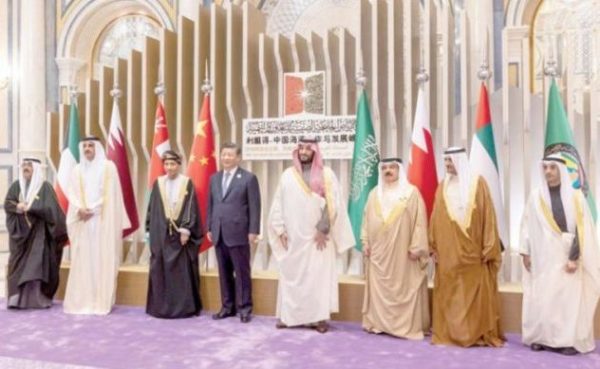BY ERIC MANDEL,*
When America is perceived as fully engaged in the Middle East, with a credible military threat, adversaries retreat, and allies feel assured.
Unfortunately, the Middle East has realigned, primarily due to America’s decision to withdraw from the region, forcing long-time American partners to reconsider America’s reliability. The region’s authoritarians prefer America as an ally over China, Russia, and Iran, but America is distracted and perceived as weak. This is why they are now looking elsewhere
The Middle East continually changes and confounds American foreign policy experts, who repeatedly fall into the trap of analyzing it through a Western lens.
In Foreign Policy, Steven Cook recently wrote, “For too long, bad assumptions have formed the basis of U.S. Middle East policy, including the notion that Iran’s leaders want to normalize ties with their neighbors. In reality, Iran does not want to share the region…The regime’s goal is to reorder the region.”
America seemed unprepared for the Chinese mediation of a rapprochement between Saudi Arabia and Iran, just as it was clueless about the Arab winter that followed the Arab Spring. For examples of American cluelessness, we can even go back to 1979, when President Jimmy Carter called Iran “an island of stability,” only to have the Islamic Revolution begin a month later.
Did the U.S. anticipate the rift between Saudi Crown Prince Mohammed bin Salman and United Arab President President Sheikh Mohamed bin Zayed Al Nahyan? Are we strategizing how to use this to our advantage, or at least to minimize its negative consequences affecting our interest in shared intelligence and the joint anti-missile defense against their common enemy, Iran?
Yes, everyone knows that America has the most substantial military presence in the region. But we are so clearly reluctant to use it that we risk irrelevance to the region’s decision-makers, and others are filling the vacuum.
When Iranian-sponsored militias attack American soldiers in places like al-Tanf in Syria — a strategic location blocking the route for shipping precision-guided missiles to Lebanon — we often fail to retaliate. This telegraphs a lack of resolve and invites further attacks.
And indeed, NBC has reported that “Iran-backed militias’ attacks against U.S. targets are up. The U.S. hasn’t responded with force since last year.”
When a Russian jet over Syrian skies attacked an American Reaper drone with flares, forcing an emergency landing, we responded with mere diplomatic finger-waving. This was an invitation to Russia and Iran and a clear message to our regional allies that they are on their own.
And what message do you think it sends China? American action and inaction in the Middle East is heard clearly in both Beijing and Taipei
So, what are some of the new relationships that make your head spin, as longtime adversaries find common ground, in almost all cases undermining American national security interests?
The Saudi-Iran rapprochement, with China’s sponsorship, is at the top of the list, with Sunni Arabs and Persian Shiites coming together due to the American abandonment of the region. As Al Jazeera reported, “China brokering a deal between longtime Gulf rivals is ‘a broader sign of a changing global order.”
Abraham Accords member UAE is increasing its cooperation with Iran, and so is Oman, both knowing that Iran is rising with Chinese and Russian backing. Even the conservative Saudi regime, which fears the Muslim Brotherhood, is meeting with Hamas, the Brotherhood’s chief progeny in the Levant. The WSJ reported, “A reset would mark a setback for U.S. and Israeli efforts to counter Iranian influence in the Middle East.”
Egypt and Turkey, who have been at odds for a decade, are also coming together as part of the new relationship puzzle of the region. And even the Arab League has invited the genocidal dictator of Syria back into the fold, another realignment where America has lost its influence. Russian and Iranian sponsorship of a Turkish-Syrian rapprochement is also eye-opening, considering the previous animosity between Turkish President Recep Tayyip Erdoğan and Syrian dictator Bashar al-Assad.
The unmistakable perception that America is withdrawing from the region forces allies into uncomfortable relationships with Iran, Russia and China, even where there is a history of animosity. Indeed, even the axis of resistance of Iran, Russia, and China is more about a shared interest in humiliating America than it is about any longstanding strategic commonalities.
The litmus test that all of the region’s players are watching, friend and foe, is America’s relationship with Israel. Suppose America, because of policy disputes based on settlement expansion and judicial reform, causes a perceived weakening of this indispensable relationship. It will be read far and near as America abandoning its most important ally in the region.
To Iran, it would mean accelerating without negative consequences its expansionism via proxies beyond Lebanon, Syria, and Iraq into the West Bank and Jordan. To Russia, it would mean it can continue to harass American soldiers, drones, and planes over the skies of the Middle East and beyond. And most importantly, to China, it will mean that Taiwan is within its grasp.
The new realignments are an opportunity and a challenge for America, underscoring a need to reassert our influence. Strength diminishes the chance of American soldiers being attacked and reduces the chance that regional adversaries will take advantage of the vacuum we have created.
The new Middle East realignment is one of the principal challenges for U.S. foreign policy and national security interests in the near-term. Treating these new relationships as tertiary concerns will cost us prestige and influence worldwide for years to come.
*Eric Mandel is the director of the Middle East Political Information Network and Mandel Strategies.
The Hill


Leave a Reply
You must be logged in to post a comment.